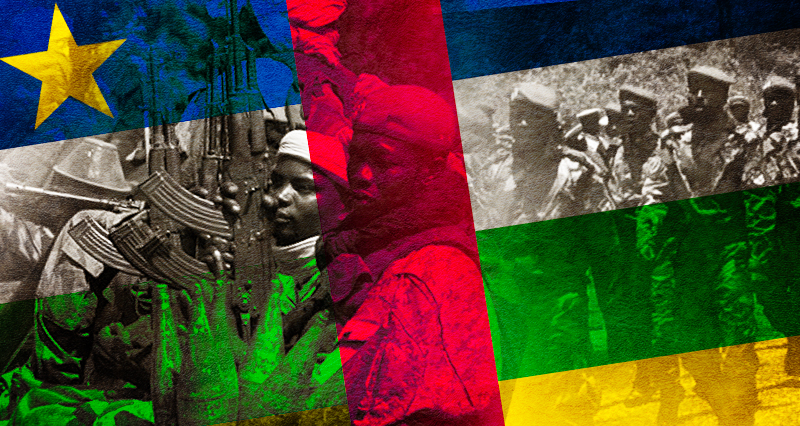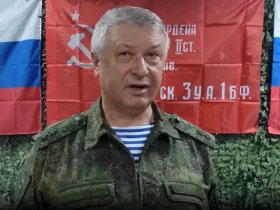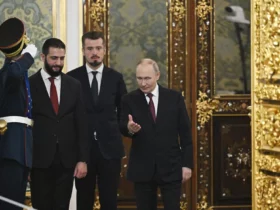In the Central African Republic, on the eve of the December 27 presidential election, opposition forces are trying to disrupt the electoral process and destabilize the country. The confrontation between the official government led by President Faustin-Archange Touadéra, who is running for a second presidential term, and armed opposition groups, has escalated in recent weeks. The opposition is demanding the postponement of the vote until calm is restored in the country.
Against this background, successive provocations and information interventions from France, the former metropole, could cost an already poor country its stability and its democratic process.
Chronology of events
On December 3, the Constitutional Court of the Central African Republic refused to allow former president François Bozizé, 74, to stand for election.
On December 4, Socrate Bozizé, the youngest son of the former president, was arrested in the Democratic Republic of Congo. According to local media reports, the reason for his detention was the recruitment of mercenaries.
On December 19, several armed groups and gangs in the Central African Republic announced the creation of the Coalition of Patriots for Change. Following this, a number of media and social networks reported that the armed groups were moving towards the capital Bangui. They have reportedly captured Bambari, a town 380 km from Bangui, but later it was taken under UN control.
“There was no violence against the inhabitants, but they looted the police station, the gendarmerie and the houses of private individuals,” Abel Matchipata, the mayor of Bambari said Tuesday.
On December 22, armed groups that formed a coalition attacked roads vital to supplying the capital, creating an atmosphere of panic among locals.
On December 23, The United Nations confirmed that a sixth town in the Central African Republic (Bangui) is “under the control” of peacekeepers.
On December 23, after the CPC failed in all attempts to cut the roads leading to the capital, the alliance of armed groups announced a unilateral cease-fire.
Who is who
Sixteen candidates are vying for the presidency in CAR, one of whom is incumbent President Touadéra, a Christian who won the 2016 presidential election.
The other active player, who has accumulated a part of the country’s opposition around him, was François Bozizé, who was not allowed to run. Bozizé came to power in a coup in 2003, won two elections, but was eventually overthrown in 2013 by the Muslim group Seleka. Bozizé left the country and was in exile. He is under the UN sanctions for “engaging in or providing support for acts that undermine the peace, stability or security…”
He returned to CAR in December 2019, where he has some popularity with the military and the Gbaya people. At the moment, the government and international community are accusing him of organizing the latest unrest in the run-up to the elections.
The opposition groups in CAR that have participated in the unrest, include:
– The Coalition of Democratic Opposition (COD-2020); an umbrella group of opposition political forces that are trying to disrupt the election are concentrated around Anicet-Georges Dologuélé, who has already been an opponent of the incumbent president in the 2016 election. He was openly supported by Bozizé as the candidate for president. This coalition openly called for the postponement of elections as the attacks of rebels started.
– The new Coalition of Patriots for Change (Coalition des patriotes pour le changement, CPC) – the main force in the new armed unrest. The composition itself denies that what is happening is a “popular protest”. Many of its members are reportedly bandits and mercenaries from neighboring states who have committed murders, raped women and girls and destroyed other people’s property. In the last days of the escalation alone, many civilians have been killed and others have been forced to seek refuge. This group also calls for postponing the presidential elections.
– The Union for Peace in the Central African Republic (UPC) – a powerful rebel group – is behind some of the attacks, according to AFP.
The political goals of COD 2020 and the CPC are completely the same. The current coordinated attacks are a means to pressure Touadera and a way to disrupt the vote and weaken his electoral position.
The UN, Russia, France and other international partners of CARhave officially supported the country’s claims that Bozizé is behind the activation of armed groups.
Information war: French double game
The scale of unrest in CAR is greatly exaggerated in the media. Local skirmishes are portrayed as a large-scale march on the capital.
Despite direct statements by the United Nations Multidimensional Integrated Stabilization Mission in the Central African Republic (MINUSCA) that the situation was under control, the media began to spread the disinformation that a coup d’état was almost complete in the .
It then became known that the French Ministry of Defense had stepped up its activities in the information space of the Central African Republic, two weeks before the presidential and legislative elections in the country.
Nathaniel Gleicher, head of the American social network’s cyber security policy, said his staff had taken down at least three separate networks that spread rumors or false information on behalf of foreign or state entities since January 2020. More than 6,000 accounts were posting messages and comments in French and Arabic aimed at promoting French military operations and initiatives in the Sahel and French-speaking Africa.
Facebook claimed it was propaganda information and deleted hundreds of questionable accounts before the elections in CAR blaming Russians and French for the intentions to influence the elections. Russians are supporting the current authorities as they gave Russian military advisers a foothold in the country, but what was the aim of French information war in the former colony?
The French connection
François Bozizé, like most of the elite of the , has many ties to France. According to Israeli researcher Eline Rosenhart, François Bozizé came to power in a French-backed coup in 2003 after France had become dissatisfied with the lack of sitting President Angle-Félix Patassé’s dependence on France. CARunder Bozizé subsequently became a bulwark of France’s corrupting influence in the region.
For example, in 2007, when Bozizé was president of the , the French company Areva bought the main operator of uranium mines in the Central African Republic, UraMin, for the inflated price of 1.8 billion euros. However, among the founders of UraMin was Cogema Development One, a subsidiary of Areva. Thus, Areva, a company, 45% of shares of which are owned by the French state, bought its own business in CARat an inflated price. In fact, this is nothing less than money laundering. And we know where it all went: the president of South Africa, Thabo Mbeki, received 490 million euros as retro-commission for a tender for Areva to build a nuclear power plant.
This scam hardly escaped the attention of CARleadership, but it chose to keep quiet about it. Their French patrons were engaged in big business and big politics.
François Bozizé is now the main candidate who could restore French influence in the . They cannot overthrow Touadera, who enjoys the protection of the Russians and Rwandans (the latter have one of the most combat-ready armies in Africa).
Therefore, it is France that is most interested in disrupting the elections, although it does not declare this publicly. Both the rebel attacks and the information war aimed at disrupting the elections are aimed at creating panic in CARand creating the impression in Africa and the rest of the world that it is impossible to hold legitimate elections in this situation. If the elections do take place, French networks of influence will insist that they are illegitimate because citizens could not freely express their opinions in the face of military confrontation.
From colonialism to neocolonialism
So why exactly is France doing this damage to the ? Because it cannot accept the loss of its former influence in a strategically and resource-rich country in Africa.
Since the loss of its colonies in Africa, France has continued to actively intervene in the internal politics of already independent states: it owns most of their natural resources, supports local financial institutions, deploys armies (as in the case of the Barkhan operation in the Sahel) and actively negotiates with local elites bribing them and raising their children in France.
During colonial times, France paid particular attention to : the French leased land for their companies and forced the local population to extract hides, ivory and work on plantations. The first major uprising took place in 1928. The territory got its independence in 1960. Thereafter, some leaders attempted to escape the dictates of Paris, but mostly unsuccessfully.
In the past decade, the country has again experienced politically active times, in fact a state of civil war: since the overthrow of Bozizé in 2013, the conflict between members of the Christian majority and the Muslim minority in CARhas escalated again, leading to the introduction of a UN peacekeeping force (MINUSCA) in 2014. Seleka (Muslims) came to power in 2013, sparking conflict with Christians from the Anti-Balaka group.
In May 2015 a reconciliation forum was held in CAR, at which leaders of the armed groups and the interim authorities signed a package of agreements.
In 2016, the country held presidential elections, which were won by Touadéra. According to supporters of Touadéra, his projects are funded mainly by the international community: rebuilding the army, increasing education from 8% to 14% of budget expenditure, free e for pregnant women and children under the age of 5, more regular pay for civil servants, etc.
A reconciliation agreement between the 14 armed groups and CARgovernment was signed in Khartoum in 2019. But in recent events, many militants have broken the agreements and started destabilizing the country.
France still owns a large part of the ’s natural resources. In 2016, WikiLeaks accused Areva of “a corrupt multi-billion-dollar” grab of uranium and other resources in the . The local workers of Areva are provided with “no means of protection nor made aware of measures to protect against radiation while trying out their activities” according to the Central African government committee report provided by WikiLeaks.
According to the NGO Global Witness, international companies that are working in the logging industry in the , were paying the local gangs and militias, thus fueling the civil war in the country. “Of all EU countries, France is most involved in ’s logging sector” report says. It also says that “the French Development Agency (AFD) has financially supported ’s logging companies, involved in both illegally logging this most precious of rainforests – vital to the climate and to thousands of forest-dependent and indigenous peoples – and funding the conflict French troops were sent to stop.”
Why the country is important
The Central African Republic is one of the poorest countries in the world, landlocked. However, CAR is rich in resources such as diamonds, gold and uranium, iron ore, manganese and a wealth of minerals, including diamonds, which account for almost half of the country’s export earnings.
Geopolitically, destabilization in CAR- the heartland of Africa – threatens peace in the entire region. Nearby is the unstable Sahel belt (the country directly borders Chad and Sudan, which regularly experience major terrorist attacks and local wars).
Thus, the struggle of third countries for influence in CARis key to Africa and its stability, and the attempt to rock the country on the eve of elections proves the importance of the upcoming electoral process.
Touadéra has prepared for the elections
The government of the country and Touadéra are doing everything to ensure that the upcoming elections will take place in full compliance with the law. Security measures have been stepped up and a consistent information campaign is underway. Representatives of the republic’s Central Electoral Commission have also prepared a sufficient number of observers from every ethnic and religious community in the country.
On Monday, the president urged people to ignore threats and vote in the presidential and parliamentary elections on December 27, as news of the rebels’ advance on Bangui is meant to spread fear in the run-up to the vote.
“What we deplore and condemn is that, instead of entering into the process so that we can have peace, now that we have recovered constitutional order, we must recover that order for democracy in the country. Unfortunately, some people are engaged in paths of violence, which the people condemn and which we also condemn”, Touadéra said.
The head of the republic examined the situation at permanent combat readiness posts. He discussed the current situation with the troops and gave the orders necessary to strengthen the defense qualities of the units.
The President of the Central African Republic has a very busy schedule, but he still found time to talk to soldiers and personally assess the situation in the army garrisons of the country according to the reports.
In order to confront armed bandits and to hedge against them, the government sought help from Russia and Rwanda, who responded and sent military and technical assistance. Russia and Rwanda have sent troops and equipment to the Republic to counter a possible outbreak of violence.
All this suggests that the situation in the country, despite the rumours, is stable enough for an election and Touadéra is in control.
Who needs destabilization?
Clearly, given the generally peaceful preparations for the elections, the destabilization of the opposition is being undertaken deliberately to discredit Touadéra and delay the elections. It is also an opportunity for former or opposition political players (such as Bozizé) to try to stage a coup d’état and seize power. Opposition figures (from abroad and locally) are actively trying to sow panic through information channels, including Facebook and other social media. The aim is to create the appearance of instability and chaos in order to postpone or spoil electoral turnout.
Meanwhile, the most important thing for CAR right now is to ensure relative stability and order, for further development. Despite rebel threats, it is important for the country to hold calm democratic elections. Touadéra is likely to be able to conduct the process calmly, given that he has the world community on his side and even military assistance from friendly states. If the government falters, militants will feel their thirst for blackmail and will try again and again to overturn the government and hamper the country’s development. The country will then face another hot civil war, which promises nothing but destruction.
The way for Turkey
Geopolitically, what is happening reflects France’s desire to regain full control of the country. Incumbent President Touadéra is trying to rely on Russia in foreign policy among extra-African countries and on Rwanda among African countries, which has made no secret of its plans to play the role of regional hegemon.
However, current events show the limitations of this approach. The allies of the current authorities in Bangui have failed to prevent dangerous attempts to destabilize the country.
If CAR seeks greater independence from France, it needs to pay attention to Turkey as well. It is no coincidence that French President Emmanuel Macron called not only the Russian, but also the Turkish presence in Africa a problem for France. The Turkish Republic is active in Africa and offers all countries of the continent to develop mutually beneficial cooperation. Instead of European colonialism, Ankara offers a relationship of equals and development.
For Turkey, in turn, CAR could be an economic partner and a point of influence in the Sahel and particularly, in neighboring Sudan and Chad. Both countries are also important for the developments in Libya.
In October, the Turkish Parliament voted for the deployment of Turkish troops to CAR and Mali as part of a UN-approved EU peacekeeping mission. Thus, Ankara showed that the region is important to it and it is ready to contribute to international peace efforts in the two strategically important countries.
The Islamic factor plays an important role in CAR: the Seleka movement was formally Islamic. Turkey could use the Islamic factor to its advantage by proposing a deradicalization strategy for the country.
Turkish business is present in CAR. In particular, under President Touadéra, the Turkish company Damnus negotiated a concession to operate the Bangui international airport.
Ankara’s economic, political, cultural, religious and military power could play a positive role in stabilizing CAR.

















Leave a Reply